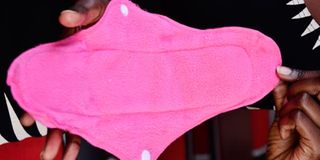Prime
5 million girls lose school time to menstruation hurdles - official

A reusable sanitary pads with flaps and fasteners at the side. With access to these, many girls would not absent themselves from school during menstruation . PHOTO BY ALEX ESAGALA
What you need to know:
- Mr Robert Kwesiga, the secretary general of the Uganda Red Cross Society, said majority girls, who lack access to sanitary pads, are always forced to stay home during their periods, to avoid stigma associated with staining school uniform with menstrual blood
About five million girls in Uganda lose at least 18 percent of their annual school time each year during their menstruation period due to lack of sanitary pads, a senior official has revealed.
Mr Robert Kwesiga, the secretary general of the Uganda Red Cross Society, said majority girls, who lack access to sanitary pads, are always forced to stay home during their periods, to avoid stigma associated with staining school uniform with menstrual blood.
“Almost 17 million children in Uganda are under 18 years, of which about eight million are girls. Of these, about five million need menstrual hygiene management facilities and sanitary pads, yet they lack access. We have to look for a permanent solution to this challenge so that girls’ education is not interrupted,” he said.
Mr Kwesiga was speaking at the launch of a reusable pads manufacturing plant in Namakwa Village, Mukono District, last Friday.
He added that girls who can’t afford modern sanitary pads opt for rudimentary ways of managing periods such as rugs, pieces of old mattresses and leaves, which sometimes expose them to infections.
A pack of modern sanitary pads cost between Shs2,000 and Shs5,000.
Mr Kwesiga said the new plant named Keep a Girl in School (KAGIS), which was set up by Uganda Red Cross Society with support from Randal Foundation, will produce 200,000 packs of re-usable pads each year.
He said 20 percent of the packs will be donated to vulnerable school girls while 80 will be sold at a subsidised price.
He added that production will later be scaled up to reach more than 150,000 women and girls in the next three years in addition to skilling young people in reusable pads production.
Ms Rachael McCormack, the chief operating officer of Randal Foundation, said missing school has a lasting diverse impact on girls, often limiting their access to employment and other opportunities throughout their lifetime. Hence Ms McCormack said creating accessible sanitary protection helps to tackle this problem.
Mr Ismael Mulindwa, the director of Basic and Secondary Education in the Ministry of Education and Sports, commended the Uganda Red Cross Society and the Randal Charitable Foundation for setting up the manufacturing plant for re-usable pads, saying it will tackle missed education opportunities for girls.
He revealed that his ministry has since 2019 led the Keep A Girl in School initiative to tackle challenges that menstruation poses to female learners.
Mr Mulindwa said the initiative aims at promoting good menstrual hygiene management practices, including provision of pads to vulnerable girls, so as to improve school retention.
“In rural communities, they become house bound, and are forced to sit over a hole dug in the middle of their mud floors until the menstrual flow ends. School-going girls who get blood on their clothes are also often teased by teachers, boys or other girls, and this had been reported as a significant cause of school drop out for girls,” he said.




